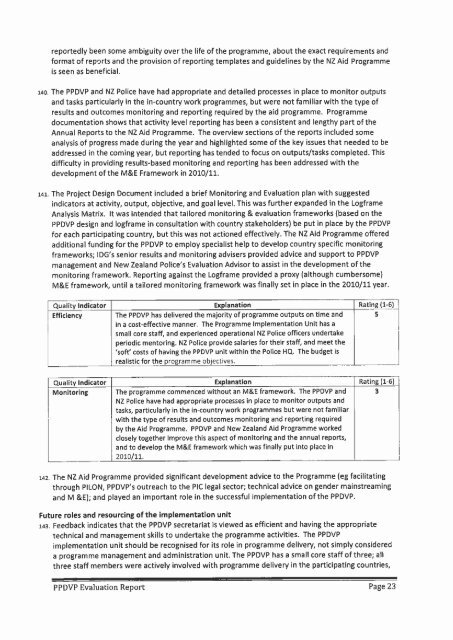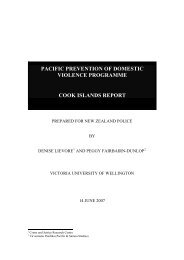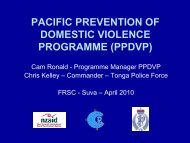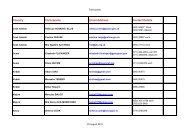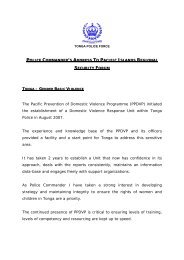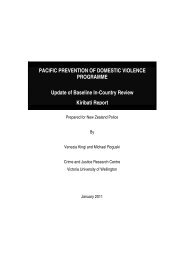PPDVP Evaluation Report - Pacific Prevention of Domestic Violence ...
PPDVP Evaluation Report - Pacific Prevention of Domestic Violence ...
PPDVP Evaluation Report - Pacific Prevention of Domestic Violence ...
You also want an ePaper? Increase the reach of your titles
YUMPU automatically turns print PDFs into web optimized ePapers that Google loves.
eportedly been some ambiguity over the life <strong>of</strong> the programme, about the exact requirements andformat <strong>of</strong> rep~rts and the provision <strong>of</strong> reporting templates and guidelines by the NZ Aid Programmeis seen as beneficial.140. The <strong>PPDVP</strong> and NZ Police have had appropriate and detailed processes in place to monitor outputsand tasks particularly in the in-country work programmes, but were not familiar with the type <strong>of</strong>results and outcomes monitoring and reporting required by the aid programme. Programmedocumentation shows that activity level reporting has been a consistent and lengthy part <strong>of</strong> theAnnual <strong>Report</strong>s to the NZ Aid Programme. The overview sections <strong>of</strong> the reports included someanalysis <strong>of</strong> progress made during the year and highlighted some <strong>of</strong> the key issues that needed to beaddressed in the coming year, but reporting has tended to focus on outputs/tasks completed. Thisdifficulty in providing results-based monitoring and reporting has been addressed with thedevelopment <strong>of</strong> the M&E Framework in 2010/11.141. The Project Design Document included a brief Monitoring and <strong>Evaluation</strong> plan with suggestedindicators at activity, output, objective, and goal level. This was further expanded in the LogframeAnalysis Matrix. It was intended that tailored monitoring & evaluation frameworks (based on the<strong>PPDVP</strong> design and logframe in consultation with country stakeholders) be put in place by the <strong>PPDVP</strong>for each participating country, but this was not actioned effectively. The NZ Aid Programme <strong>of</strong>feredadditional funding for the <strong>PPDVP</strong> to employ specialist help to develop country specific monitoringframeworks; IDG's senior results and monitoring advisers provided advice and support to <strong>PPDVP</strong>management and New Zealand Police's <strong>Evaluation</strong> Advisor to assist in the development <strong>of</strong> themonitoring framework. <strong>Report</strong>ing against the Logframe provided a proxy (although cumbersome)M&E framework, until a taiIored monitoring framework was finally set in place in the 2010/11 year.Quality IndicatorEfficiencyExplanationThe <strong>PPDVP</strong> has delivered the majority <strong>of</strong> programme outputs on time andin a cost-effective manner. The Programme Implementation Unit has asmall core staff, and experienced operational NZ Police <strong>of</strong>ficers undertakeperiodic mentoring. NZ Police provide salaries for their staff, and meet the's<strong>of</strong>t' costs <strong>of</strong> having the <strong>PPDVP</strong> unit within the Police HQ. The budget isrealistic for the programme objectives.Ratingi(1-6)1Quality IndicatorMonitoringExplanationThe programme commenced without an M&E framework. The <strong>PPDVP</strong> andNZ Police have had appropriate processes in place to monitor outputs andtasks, particularly in the in-country work programmes but were not familiarwith the type <strong>of</strong> results and outcomes monitoring and reporting requiredby the Aid Programme. <strong>PPDVP</strong> and New Zealand Aid Programme workedclosely together Improve this aspect <strong>of</strong> monitoring and the annual reports,and to develop the M&E framework which was finally put into place in2010/11.Rating (1-6)3142. The NZ Aid Programme provided significant development advice to the Programme (eg facilitatingthrough PILON, <strong>PPDVP</strong>'s outreach to the PIC legal sector; technical advice on gender mainstreamingand M &E); and played an important role in the successful implementation <strong>of</strong> the <strong>PPDVP</strong>.Future roles and resourcing <strong>of</strong> the implementation unitus. Feedback indicates that the <strong>PPDVP</strong> secretariat is viewed as efficient and having the appropriatetechnical and management skills to undertake the programme activities. The <strong>PPDVP</strong>implementation unit should be recognised for its role in programme delivery, not simply considereda programme management and administration unit. The <strong>PPDVP</strong> has a small core staff <strong>of</strong> three; allthree staff members were actively involved with programme delivery in the participating countries,<strong>PPDVP</strong> ~valuaiion <strong>Report</strong>Page 23


